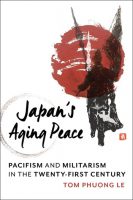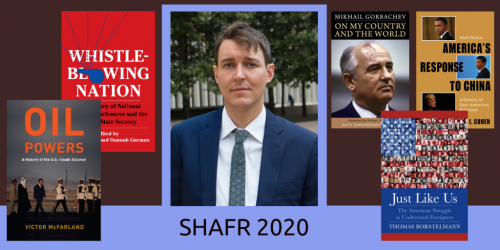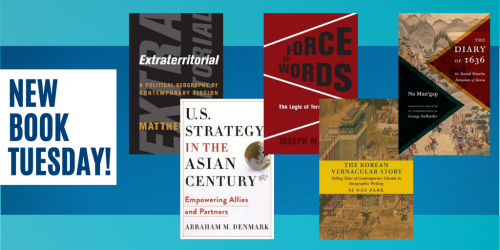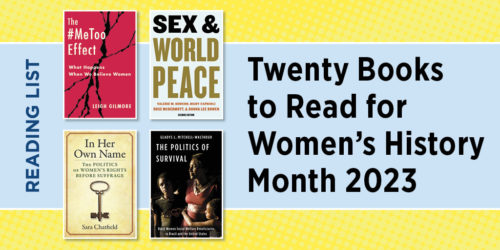Browse Our ISA 2021 Virtual Exhibit Booth with Caelyn Cobb

Hello, and welcome to the second annual (and hopefully the last) Columbia University Press International Studies Association Virtual Exhibit Booth! I’m Caelyn Cobb, the editor for global and international politics, coming to you live from my apartment in Queens, New York, where I have long ago swapped my blazers for bathrobes but still carry around coffee in a travel mug to feel like I’m going somewhere.
I’ll cut to the chase. No, we don’t have anything about the Suez Canal or Biden’s foreign policy. We do have a book about Egyptian politics coming out soon, though, and you might be interested in this book on the U.S.–Saudi alliance (for no reason, of course!). We also have a lot of new books to share. We published so many great books throughout the past year, many of which were written, copyedited, and proofread against the backdrop of a global pandemic and an off-the-rails, doomscroll-inducing period in American politics. As you explore our virtual ISA booth, be sure to give a little extra love to these intrepid 2020 and 2021 titles that were launched into unprecedented chaos, without the benefit of traditional book talks, signings, and in-person conferences.
Here’s a brief listing of some recent authors and editors in this field who deserve a round of applause for all their hard work in these crazy times. Get 20% off these hardy scholarly titles and more on our website using our promo code ISA.
Spring/Summer 2020
Valerie M. Hudson, Donna Lee Bowen, and Perpetua Lynne Nielsen, The First Political Order: How Sex Shapes Governance and National Security Worldwide — A data-driven exploration of male supremacy—and how to dismantle it.
Kaeten Mistry and Hannah Gurman, eds., Whistleblowing Nation: The History of National Security Disclosures and the Cult of State Secrecy — A pathbreaking, interdisciplinary history of national security disclosures and state secrecy from World War I to the present.
Lorenzo Vidino, The Closed Circle: Joining and Leaving the Muslim Brotherhood in the West — An unprecedented inside view into one of the world’s most influential Islamist groups and how it operates.
Peter Krause and Ora Szekely, eds., Stories from the Field: A Guide to Navigating Fieldwork in Political Science — A relatable, thoughtful, and unorthodox guide to field research in political science. (Check out the companion podcast, too!)
Saori N. Katada, Japan’s New Regional Reality: Geoeconomic Strategy in the Asia-Pacific — A comprehensive analysis of Japan’s geoeconomic strategy that reveals the country’s role in shaping regional economic order in the Asia-Pacific.
Michael Dumper, Power, Piety, and the People: The Politics of Holy Cities in the Twenty-First Century — A look into the causes and consequences of contemporary conflicts in the holy cities of Jerusalem, Córdoba, Banaras, Lhasa, and George Town in Malaysia.
Erin M. Kearns and Joseph K. Young, Tortured Logic: Why Some Americans Support the Use of Torture in Counterterrorism — A detailed analysis that draws upon a novel series of group experiments to help us understand how and why the average U.S. citizen might come to support the use of torture techniques.
Fall 2020
Abraham M. Denmark, U.S. Strategy in the Asian Century: Empowering Allies and Partners — A vital perspective on the future of power dynamics in the Indo-Pacific, focusing on the critical roles that American allies and partners can play.
Joseph M. Brown, Force of Words: The Logic of Terrorist Threats — A groundbreaking examination of the role of threats in terrorist strategies that explains the broader purpose and meaning of terrorist propaganda.
Costantino Pischedda, Conflict Among Rebels: Why Insurgent Groups Fight Each Other — An examination of civil wars in Iraq, Ethiopia, Lebanon, Sri Lanka, and Syria that seeks to understand why rebel groups frequently clash instead of cooperating against their shared enemy, the state.
Spring 2021
Jesse Driscoll, Doing Global Fieldwork: A Social Scientist’s Guide to Mixed-Methods Research Far from Home — An up-to-date methodological guide for graduate students and social science researchers of all stripes who need blunt, no-nonsense advice about how to make the best of their time in the field.
Margarita M. Balmaceda, Russian Energy Chains: The Remaking of Technopolitics from Siberia to Ukraine to the European Union — An incisive examination of the the economics, politics, and social issues surrounding post-Soviet energy.
Amy Myers Jaffe, Energy’s Digital Future: Harnessing Innovation for American Resilience and National Security — An expert, insightful view of how technological advancements are transforming the global energy landscape in the twenty-first century, and how the United States can embrace this digital revolution.
Burcu Baykurt and Victoria de Grazia, eds., Soft-Power Internationalism: Competing for Cultural Influence in the 21st-Century Global Order — A global comparative history of how “soft power” came to define the era between the celebration of global capitalism in the 1990s and the recent resurgence of nationalism and authoritarianism.
Tom Phuong Le, Japan’s Aging Peace: Pacifism and Militarism in the Twenty-First Century — A look at how changing perceptions of security across generations has culminated in a culture of antimilitarism in Japan.
Stay tuned over the coming days for more virtual ISA from Columbia, both on the blog and via many tweets from yours truly at @caelyncobb. Please also check out Columbia International Affairs Online (CIAO), an unparalleled collection of the latest work from the world’s top international affairs institutes, and the exciting books in international affairs from our distributed press colleagues such as Agenda Publishing, transcript publishing, Fernwood Publishing, ibidem Press, and more.
Categories:Agenda PublishingBook ExcerptDistributed PressesFernwood PublishingHistoryibidem PressInternational RelationsInternational Studies AssociationPoliticsTranscript VerlagVirtual Exhibits
Tags:Abraham M. DenmarkAmy Myers JaffeBurcu BaykurtCaelyn CobbConflict Among RebelsCostantino PischeddaDoing Global FieldworkDonna Lee BowenEnergy’s Digital FutureErin M. KearnsForce of WordsHannah GurmanISA2021Japan's Aging PeaceJapan's New Regional RealityJesse DriscollJoseph K. YoungJoseph M. BrownKaeten MistryLorenzo VidinoMargarita M. BalmacedaMichael DumperOra SzekelyPerpetua Lynne NielsenPeter KrausePower Piety and PeopleRussian Energy ChainsSaori N. Katada 片田さおりSoft-Power InternationalismStories from the FieldThe Closed CircleThe First Political OrderTom Phuong LeTortured LogicU.S. Strategy in the Asian CenturyValerie M. HudsonVictoria de GraziaWhistleblowing Nation












